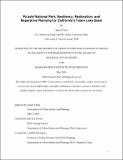Pa’ashi National Park: Resiliency, Restoration, and Reparative Planning for California’s Tulare Lake Basin
Author(s)
O'Neil, Hazel
DownloadThesis PDF (19.45Mb)
Advisor
Pierite, Jean-Luc
Terms of use
Metadata
Show full item recordAbstract
In 2023, a series of atmospheric rivers reawakened California's largest sleeping lake, Pa'ashi, in the California Tulare Lake Basin. This thesis supports the proposal of the Tachi Yokut Tribe, one of the watershed's Indigenous communities, to preserve Pa'ashi in the form of a new National Park. I present historical and environmental context that explains how the lake was put to sleep by Manifest Destiny-era agricultural settlement and subsequent consolidation of political control over water. I argue that the Tachi Yokut Tribe's proposal for a National Park is a pragmatic, feasible, and desirable planning response to the region's interwoven challenges of climate change, ecological imbalance, and pervasive environmental injustice. I demonstrate how the community might develop the ideas of the park further through a sample visioning process and landscape design framework for the watershed. This thesis advances a theory of "two-eyed seeing" (Bartlett et al 2012) planning practice by centering Indigenous values and planning scholarship to articulate how planners and designers might foster stronger connections between people, place, and nature when undertaking landscape-scale climate adaptation projects.
Date issued
2024-05Department
Massachusetts Institute of Technology. Department of Urban Studies and PlanningPublisher
Massachusetts Institute of Technology